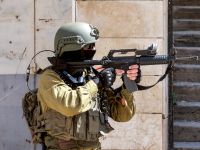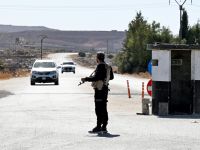In recent weeks, Osama bin Laden’s al-Qaeda network has heightened its financial activity considerably, suggesting some leaders are reasserting control and may be attempting to finance further attacks against American interests, a U.S. official claimed.
The extended flow of money corresponds with a recent growth in communications between surviving al-Qaeda members, the official said, speaking on condition of anonymity.
The communications, detected by U.S. intelligence, have occurred between small groups of al-Qaeda fighters and Taliban allies, officials said.
The majority of the activity is focused in the northwestern part of Pakistan, close to the Afghan border, although some money and communications are going elsewhere, one official said.
The activity suggests some known al-Qaeda leaders are re-establishing control over surviving parts of the terrorist network, the official said, declining to specifically name the leaders. U.S. intelligence has detected a significant enhancement in money transfers within the al-Qaeda organization to people who could use it to prepare future attacks on American interests, although the official provided no details on potential attacks.
"There's lots of signs al-Qaeda is reconstituting itself," said Vince Cannistraro, a former CIA counter-terrorist chief, according to AP.
"Internet traffic has picked up enormously. Money is moving around. There is some evidence leadership is active."
The whereabouts and fate of many of al-Qaeda's senior commanders is still unknown. While several have been killed in the midst of the Afghan war, and a few captured, many are believed to have holed-up in caves in Afghanistan to wait out the U.S. bombing strikes.
For his part, Osama Bin Laden, leader of the Al Qaeda network, has been silent for months. U.S. intelligence has had vague indications he remained in the Afghan-Pakistan border region. Officials have few doubts he is still alive.
Just last week, U.S. President George W. Bush described him as "marginalized," and intelligence officials, during classified briefings to congressional leaders, suggested he had been wounded and may be quietly recovering somewhere. However, they acknowledge there is no hard evidence on his condition.
Cannistraro said finding Osama bin Laden remains as vital as ever. "It's pretty clear they don't know where he is, which is why they are de-emphasizing the importance of him," he explained.
Other top leaders capable of masterminding attacks, such as Ayman al-Zawahri and Abu Zubaydah, still remain at large. Al-Zawahri, bin Laden's doctor and spiritual adviser, survived bombings in Afghanistan. Zubaydah, previously based in Pakistan, had contacts with al-Qaeda cells worldwide.
The U.S. official added that while there was some evidence of al-Qaeda's leadership at work, many of its cells are capable of conducting attacks independent of top commanders.
The hijackers who committed the September 11 attacks received money from bin Laden's financial chief, also known as Mustafa Ahmed al-Hisawi and Shaikh Saiid. He escaped the UAE for Pakistan two days after the attacks, and his whereabouts still remain unknown.
The global financial crackdown on terrorist money has hindered al-Qaeda's ability to finance attacks, officials said, however, it never stopped.
Meanwhile, on Friday, a senior Treasury Department official said that more than 150 countries have joined Washington in helping to freeze accounts and block transactions between suspected terrorists, including al-Qaeda operatives.
It should be noted that the United States has frozen more than $35 million, while the combined effort of other countries has halted about $70 million, according to Mike Romey, special assistant to the treasury secretary for national security.
Al-Qaeda's money is believed to come from various sources: Saudi-born millionaire Osama bin Laden's personal fortune, donations of seemingly legitimate Islamic humanitarian concerns, and gold trading.
The activity within Pakistan is one of the strongest indications yet that al-Qaeda is trying to reconstitute itself. U.S. intelligence has been monitoring countries for the arrival of al-Qaeda fighters from Afghanistan. Yemen, Somalia, Sudan and Indonesia are top prospects, according to officials and experts. (Albawaba.com)
© 2002 Al Bawaba (www.albawaba.com)







